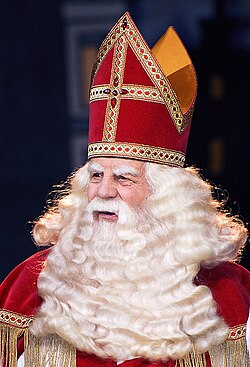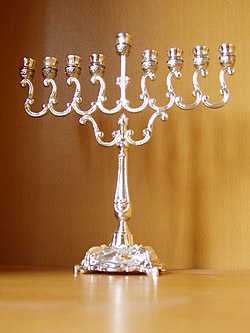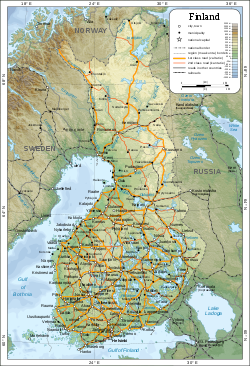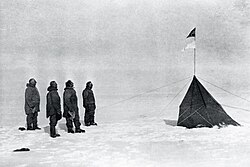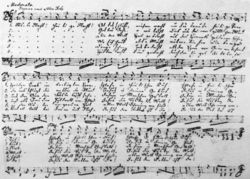December
| << | December | >> | ||||
| Su | Mo | Tu | We | Th | Fr | Sa |
| 1 | 2 | 3 | 4 | 5 | 6 | |
| 7 | 8 | 9 | 10 | 11 | 12 | 13 |
| 14 | 15 | 16 | 17 | 18 | 19 | 20 |
| 21 | 22 | 23 | 24 | 25 | 26 | 27 |
| 28 | 29 | 30 | 31 | |||
December (Dec.) is the twelfth and last month of the year in the Gregorian calendar, coming between November (of the current year) and January (of the following year). It has 31 days. With the name of the month coming from the Latin decem for "ten", it was the tenth month of the year before January and February were added to the Roman calendar.
December always begins on the same day of the week as September, and ends on the same day of the week as April.
December's flower is the Narcissus. Its birthstone is the turquoise.
Some of the holidays celebrated in December are Christmas, New Year's Eve, Kwanzaa, and Hanukkah.
The Month
December is the twelfth and last month of every calendar year in the Gregorian calendar, and is one of seven months of the year to have 31 days. December 31 is followed by January 1 of the following year.
December begins on the same day of the week as September every year, as each other's first days are exactly 13 weeks (91 days) apart. December ends on the same day of the week as April every year, as each other's last days are exactly 35 weeks (245 days) apart.
In common years, December starts on the same day of the week as April and July of the previous year, and in leap years, October of the previous year. In common years, December finishes on the same day of the week as July of the previous year, and in leap years, February and October of the previous year. In leap years and years immediately after that, December both starts and finishes on the same day of the week as January of the previous year.
In years immediately before common years, December starts on the same day of the week as June of the following year, and in years immediately before leap years, March and November of the following year. In years immediately before common years, December finishes on the same day of the week as September of the following year, and in years immediately before leap years, March and June of the following year.
December is one of two months to have a solstice (the other is June, its seasonal equivalent in both hemispheres), and in this month the Tropic of Capricorn in the Southern Hemisphere is turned towards the Sun, meaning that December 21 or December 22 is the Northern Winter Solstice and the Southern Summer Solstice. This means that this date would have the least daylight of any day in the Northern Hemisphere, and the most in the Southern Hemisphere. There are 24 hours of darkness at the North Pole and 24 hours of daylight at the South Pole.
In mainly Christian countries, December is dominated by Christmas, which is celebrated on December 25 in most of those countries, though Eastern Orthodox Christians celebrate it on January 7. It marks the birth of Jesus Christ. Epiphany, January 6, is also important in relation to Christmas. Advent starts on the Sunday on, or closest to, November 30, and some countries have their own related celebration before the 25th. Sinterklaas is celebrated on December 5 in the Netherlands and Belgium, and St. Nicholas Day on December 6 is also celebrated in some countries. The Scandinavian countries, mainly Sweden, celebrate St. Lucia Day on December 13, while Iceland celebrates Thorlaksmessa on December 23. The week after Christmas is spent preparing for New Year.
Judaism's festival of light, Hanukkah, is also celebrated over eight days in this month.
Holidays and Festivals
Fixed dates

- December 1 - World AIDS Day
- December 1 - National Day of Romania
- December 1 - Self-government Day (Iceland)
- December 1 - Day of Restoration of Independence (Portugal)
- December 1 - First Day of Summer (Australia)
- December 2 - National Day of Laos
- December 2 - National Day of the United Arab Emirates
- December 2 - International Day for the Abolition of Slavery
- December 4 - Navy Day in India and Italy
- December 4 - Miners' Day (Poland)
- December 4 - Tupou I Day (Tonga)
- December 5 - Sinterklaas (Netherlands, Belgium)
- December 5 - Birthday of King Bhumibol Adulyadej of Thailand
- December 6 - Saint Nicholas Day
- December 6 - Independence Day (Finland)
- December 6 - Constitution Day (Spain)
- December 7 - Pearl Harbor Day (United States)
- December 8 - Constitution Day in Romania and Uzbekistan
- December 8 - Day of the Immaculate Conception (Roman Catholicism)
- December 9 - National Day of Tanzania
- December 10 - Nobel Prize Day
- December 10 - Constitution Day (Thailand)
- December 10 - Human Rights Day
- December 11 - Republic Day (Burkina Faso)
- December 11 - Indiana Day
- December 11 - International Mountain Day
- December 12 - Independence Day (Kenya)
- December 12 - Our Lady of Guadalupe (Roman Catholicism)
- December 13 - St. Lucia Day
- December 14 - Alabama Day
- December 15 - Homecoming Day (Alderney)
- December 15 - Kingdom Day (Netherlands)
- December 15 - Zamenhof Day (Esperanto supporters)
- December 16 - Independence Day (Kazakhstan)
- December 16 - Day of Reconciliation (South Africa)
- December 16 - Victory Day in India and Bangladesh
- December 17 - National Day of Bhutan
- December 18 - National Day of Qatar
- December 18 - New Jersey Day
- December 18 - Republic Day (Niger)
- December 18 - International Migrants Day
- December 18 - United Nations Day of the Arabic language
- December 21/22 - Northern Winter Solstice and Southern Summer Solstice
- December 22 - Dongzhi Festival (East Asia)
- December 22 - Mother's Day (Indonesia)
- December 23 - Birthday of Emperor Akihito (Japan)
- December 23 - Thorlaksmessa/St. Thorlak's Day (Iceland)
- December 23 - HumanLight (Secular Humanism)
- December 24 - Independence Day (Libya)
- December 24 - Christmas Eve in Western Christianity
- December 25 - Christmas Day in Western Christianity
- December 25 - Birthday of Muhammad Ali Jinnah (Pakistan)
- December 26 - Boxing Day (UK)
- December 26 - St. Stephen's Day (Republic of Ireland)
- December 26 - First Day of Kwanzaa
- December 27 - Constitution Day (North Korea)
- December 27 - St. Stephen's Day (Eastern Orthodox Church)
- December 28 - Proclamation Day (South Australia)
- December 28 - Day of the Holy Innocents, celebrated in Spanish-speaking countries in a similar way to April Fools' Day
- December 29 - Independence Day (Mongolia)
- December 31 - New Year's Eve/ St. Silvester's Day - known as Hogmanay in Scotland and Calennig in Wales
+{{{1}}}−{{{2}}}
Moveable and Non-Single Day Events
- Hanukkah (Judaism) - celebrated over a period of eight days
- Advent in Western Christianity
- First Sunday in Advent occurs between November 27 and December 3
- Second Sunday in Advent occurs between December 4 and December 10
- Third Sunday in Advent occurs between December 11 and December 17
- Fourth and final Sunday in Advent occurs between December 18 and December 24
- Kwanzaa is from December 26 to January 1
- Marathon races held in December
+{{{1}}}−{{{2}}}
Historical Events

- December 1, 1918 - The Kingdom of Yugoslavia is proclaimed. On the same day, Transylvania unites with Romania.
- December 1, 1918 - Iceland becomes independent, but remains under the Danish crown.
- December 1, 1955 - A protest by Rosa Parks on an Alabama bus starts the Montgomery Bus Boycott.
- December 2, 1804 - Napoleon Bonaparte crowns himself Emperor of France.
- December 2, 1942 - A team led by Enrico Fermi initiates the first nuclear chain reaction.
- December 3, 1984 - A deadly chemical leak in Bhopal, India, kills 8,000 people instantly.
- December 5, 2013 - Former South African President and Anti-Apartheid icon Nelson Mandela dies aged 95.
- December 6, 1917 - Finland declares independence from Russia.
- December 7, 1941 - During World War II, The Japanese attack Pearl Harbor, Hawaii, US.
- December 8, 1980 - John Lennon is shot dead by Mark David Chapman.
- December 9, 1961 - Tanganyika becomes independent. It later merges with Zanzibar to form Tanzania.
- December 10, 1901 - The first Nobel Prizes are awarded.
- December 11, 1936 - King Edward VIII of the United Kingdom abdicates from the throne.
- December 12, 1911 - Delhi becomes the capital city of India.
- December 12, 1963 - Kenya becomes independent from the United Kingdom.
- December 14, 1861 - Albert, Prince Consort of Great Britain and Ireland dies aged 42, placing Queen Victoria in a state of mourning his loss for the rest of her life.
- December 14, 1911 - A Norwegian expedition led by Roald Amundsen reaches the South Pole, where previously no human had ever been.
- December 15, 1891 - James Naismith introduces basketball.
- December 16, 1920 - An earthquake in Gansu province, China, kills around 200,000 people.
- December 16, 1991 - Kazakhstan declares independence from the Soviet Union.
- December 17, 1903 - The Wright brothers make their first flight in Kitty Hawk, North Carolina.
- December 17, 1907 - Ugyen Wangchuck becomes King of Bhutan.
- December 17, 2010 - Start of the Arab Spring, a series of uprisings across North Africa and the Middle East.
- December 19, 1783 - William Pitt the Younger becomes the youngest Prime Minister of Great Britain.
- December 20, 1999 - Portugal gives control of Macau to the People's Republic of China.
- December 21, 1898 - Marie and Pierre Curie announce their discovery of radium.
- December 21, 1913 - The first crossword puzzle is published.
- December 21, 1988 - A terrorist bomb explodes on Pan Am Flight 103 over Lockerbie, southern Scotland, killing 270 people.
- December 21, 2012 - End of the Mayan long-count calendar.
- December 22, 1989 - The Brandenburg Gate is re-opened.
- December 22, 1990 - Lech Walesa becomes President of Poland.
- December 23, 1972 - A major earthquake strikes Nicaragua, killing thousands of people.
- December 24, 1818 - The Christmas carol Silent Night is first performed at a church in Austria.
- December 24, 1914 - The World War I Christmas truce takes place.
- December 24, 1951 - Libya becomes independent.
- December 24, 1968 - Apollo 8 orbits the Moon, and a stunning photograph of the Earth rising is taken.
- December 25, 800 - Charlemagne is crowned Holy Roman Emperor.
- December 25, 1066 - William the Conqueror is crowned King of England in Westminster Abbey.
- December 26, 1991 - The USSR collapses.
- December 26, 2004 - An earthquake off Sumatra, Indonesia, leads to tsunamis that kill over 300,000 people on Indian Ocean coasts, with nearby Sumatra being worst affected.
- December 27, 531 - Inauguration of the Hagia Sophia as a church in what was then called Byzantium.
- December 27, 1949 - Queen Juliana of the Netherlands officially recognizes Indonesia's independence.
- December 28, 1612 - Galileo Galilei observes the planet Neptune, though there is dispute as to whether he mistook it for a star.
- December 28, 1879 - The Tay Rail Bridge disaster on the east coast of Scotland kills 75 people.
- December 28, 1895 - The Lumiere brothers open their first cinema in Paris.
- December 29, 1911 - Mongolia becomes independent.
- December 30, 1922 - The USSR is founded.
- December 30, 2011 - This date is skipped in Samoa as the International Date Line is shifted.
- December 31, 1857 - Ottawa is chosen as capital city of Canada.
- December 31, 1999 - The US hands control of the Panama Canal over to Panama.
+{{{1}}}−{{{2}}}
Trivia

- The first Sunday of Advent is slightly more likely to fall in November than in December.
- The star signs for December are Sagittarius (November 22 to December 21) and Capricorn (December 22 to January 20).
- December 28 falls exactly half-way between the two Scottish celebrations of Saint Andrew's Day (November 30) and Burns Night (January 25).
- In a leap year, December 31 is the 366th day of the year, rather than the 365th.
- At the North Pole, the Sun does not rise in December; at the South Pole, it does not set.
December Media
Yellow narcissus flower
Rough and polished tanzanite
A Christmas tree at the Eaton Centre in Toronto.
| Months of the Year |
|---|
|
January | February | March | April | May | June | July | August | September | October | November | December |


